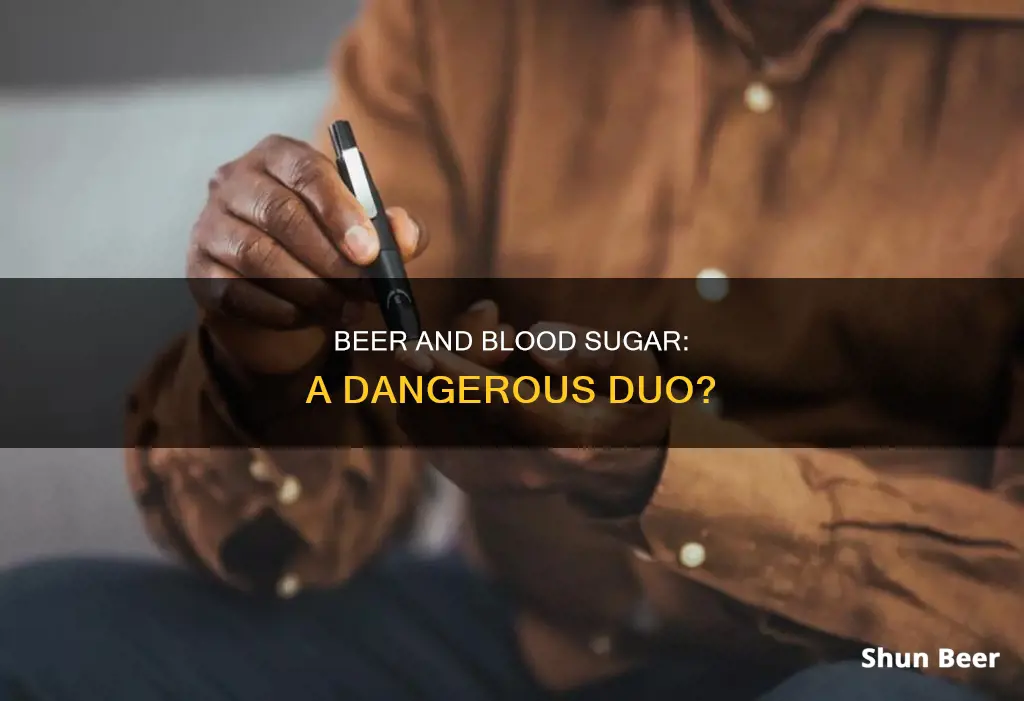
Alcoholic drinks can be full of sugar, and too much sugar in your diet can lead to weight gain and other health issues. Alcoholic drinks are responsible for more than nine per cent of the sugar consumed by people aged 18-74 in the UK. All alcoholic drinks contain some sugar, but fortified wines, sherries, liqueurs, cider and pre-mixed drinks like alcopops have particularly high levels. A pint of cider can contain as many as five teaspoons of sugar. Alcohol can alter your blood sugar level, which increases the risk of developing alcohol-related diabetes and is very dangerous for people with the condition. Excessive alcohol consumption can reduce the effectiveness of insulin, which results in high blood sugar levels.
What You'll Learn

Alcohol can cause hypoglycaemia
The liver is responsible for eliminating toxins from the body and regulating blood sugar levels. When a person consumes alcohol, the liver has to work to remove it from the blood, which prevents it from releasing glucose into the blood efficiently. This can lead to a drop in blood sugar levels, resulting in hypoglycaemia. Binge drinking, heavy drinking, and consuming alcohol on an empty stomach increase the risk of hypoglycaemia.
Alcohol can also interfere with diabetes medications, causing blood glucose levels to drop further. Additionally, the symptoms of hypoglycaemia, such as dizziness and lack of coordination, can be similar to those of alcohol intoxication, making it difficult to distinguish between the two conditions.
To prevent alcohol-induced hypoglycaemia, it is recommended to drink in moderation, eat before drinking, and monitor blood sugar levels regularly, especially before and after consuming alcohol. It is crucial for people with diabetes to understand the risks associated with alcohol consumption and to consult their doctor about the safety of drinking alcohol while on medication.
Beer and Bupropion SR: Is It Safe to Drink?
You may want to see also

Alcohol prevents the liver from regulating blood sugar
Alcohol can cause blood glucose levels to rise or fall, depending on how much you drink. The liver is very important when it comes to regulating blood sugar levels throughout the day. The main function of your liver is to store glycogen, which is then stored in the form of glucose. When drinking, alcohol affects the liver and its ability to release glucose into the bloodstream.
Alcohol is capable of raising your blood sugar. Alcoholic drinks are high in sugar. This can cause your blood sugar to spike. The effects of alcohol on your blood sugar will initially increase as the sugar from alcohol enters your blood, then peak once the maximum amount of sugar in the alcohol has been absorbed. This can take about 1-2 hours. Your body then releases insulin to bring your high sugar level down and inhibits the release of glucose removed from the liver. So your blood sugar will initially spike then decrease.
Once your body has absorbed all the sugar it can from alcohol, it will start to use up the sugar, decreasing your blood sugar levels. Alcohol impairs liver function and can keep your liver from releasing enough glycogen to keep your blood glucose levels from going too low. As the liver inhibits the release of more sugar, your blood sugar levels will lower. This makes your blood sugar low as long as the alcohol keeps impacting your liver’s normal function.
Once enough alcohol has been removed from the body your liver will regain the ability to release sugar. This often takes about 12 hours. If a diabetic drinks alcohol and takes insulin as their prescribed treatment they may experience hypoglycemia, low blood sugar. Some other diabetes medications work to also lower blood glucose levels by stimulating the pancreas to make more insulin. Combining these medications and alcohol can lead to insulin shock, which is a medical emergency.
Shanghai's Public Drinking Laws: Beer Allowed?
You may want to see also

Alcohol interferes with diabetes medication
Alcohol can interfere with diabetes medication in several ways, and people with diabetes should be cautious when drinking. Alcohol can cause blood glucose levels to rise or fall, depending on how much is consumed and how often. This can lead to hypoglycaemia or "insulin shock", a medical emergency.
The liver's main function is to store glycogen, the stored form of glucose, to provide the body with a source of glucose when food hasn't been eaten. When alcohol is consumed, the liver has to work to remove it from the blood instead of regulating blood sugar. This means that drinking alcohol on an empty stomach can prevent the liver from doing its job and lead to hypoglycaemia.
Alcohol also interferes with the liver's ability to produce glucose, so it is important to check blood sugar levels before consuming alcohol. Alcohol can cause blood glucose levels to drop within a few minutes of drinking, and this can last for up to 12 hours. Therefore, it is important to check blood glucose levels after drinking and eat a snack if levels are low.
Additionally, drinking alcohol can be dangerous as it can be difficult to distinguish between the symptoms of hypoglycaemia and drunkenness. Both can cause dizziness, sleepiness and disorientation. This risk is increased for those who often have hypoglycaemia unawareness, a condition where one does not recognise they are experiencing low blood sugar.
Furthermore, alcohol can interact with diabetes medications. Some diabetes pills, such as sulfonylureas and meglitinides, lower blood glucose levels by stimulating the pancreas to produce more insulin. Combining these medications with alcohol can lead to dangerously low blood sugar as the liver's ability to regulate blood sugar is interfered with.
It is important for those with diabetes to consult their doctor about drinking alcohol, even if it is only occasional, to understand the risks and which medications are best for them.
Freezing Beer: Is It Still Drinkable?
You may want to see also

Alcohol can cause weight gain
Alcoholic drinks are full of empty calories and have no nutritional value, which can be bad for your waistline. Alcohol can also stimulate your appetite, leading to overeating and weight gain.
Alcoholic drinks can contain lots of sugar, and a pint of cider can have as many as five teaspoons of sugar. Sugar is very high in calories, and excessive consumption can lead to unhealthy weight gain. Being overweight can make you more susceptible to long-term health problems, including heart disease, certain types of cancer, and type 2 diabetes.
Additionally, the calories consumed through alcohol are usually additional to the calories consumed in food, leading to a higher overall calorie intake. This can result in weight gain.
Drinking alcohol can also make it difficult to lose weight due to its high calorie content. Alcoholic drinks contribute to more than nine percent of the 'free sugar' consumed by people aged 18-74 in the UK.
Furthermore, drinking heavily can lead to significant weight changes, which is one of the physical signs of alcohol abuse.
Beer and Hernia: What You Need to Know
You may want to see also

Alcohol can increase the risk of developing diabetes
Alcohol can indeed increase the risk of developing diabetes. Excessive alcohol intake is associated with an increased risk of type 2 diabetes. However, the relationship between alcohol and type 2 diabetes is complex.
Firstly, alcohol can interfere with blood sugar levels and the hormones needed to maintain healthy blood sugar levels. Alcohol can cause blood glucose levels to rise or fall, depending on how much you drink. When you drink alcohol, your liver has to work to remove it from your blood instead of regulating blood sugar. This can lead to hypoglycaemia or "insulin shock", a medical emergency.
Secondly, alcohol can prevent the liver from doing its job of regulating blood sugar. The liver stabilises glucose levels by storing carbohydrates and releasing them into the bloodstream. When you drink alcohol, your liver prioritises metabolising the alcohol, which can lead to hypoglycaemia.
Thirdly, alcohol can interact with diabetes medications. Some diabetes medications also lower blood glucose levels, and combining them with alcohol can lead to dangerous drops in blood sugar levels.
Additionally, alcohol can contribute to weight gain as it is often high in calories. This can further increase the risk of developing type 2 diabetes.
Finally, heavy drinking can lead to raised blood pressure, nerve damage, dehydration, certain cancers, and heart disease, all of which are risk factors for diabetes.
Therefore, it is important for individuals to follow government guidelines on alcohol consumption and speak to their doctor about safe drinking habits, especially if they have diabetes or are at risk of developing it.
Understanding Sobriety: Non-Alcoholic Beer's Impact
You may want to see also







